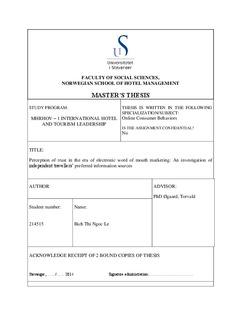Perceptions of trust in the era of electronic word of mouth marketing
Master thesis
Permanent lenke
http://hdl.handle.net/11250/223518Utgivelsesdato
2014-06-11Metadata
Vis full innførselSamlinger
- Studentoppgaver (SV-NHS) [561]
Sammendrag
The thesis focuses on understanding independent travellers‟ behavior patterns regarding online travel planning, specifically on how travellers consider and evaluate information provided by different channels. The research was conducted based on data collecting from 88 students at the University of Stavanger, Norway.
The main aim of the thesis is to find out the traveller‟s most preferred information provider, using Conjoint Analysis as the main research instrument. Four different information channels were included in the research, i.e. information from local tourism authority, recommendations from the traveller‟s friends or relatives, reviews and ratings from the website TripAdvisor, and promotional information from accommodation providers. Findings from the study suggest that recommendations from friends or relatives and reviews from TripAdvisor are considered significantly more important than the other two resources. Nevertheless, due to the issue of content‟s integrity on the website TripAdvisor, friends or relative‟s recommendations is considered the most reliable information source. Small analysese focusing on gender, experience and TripAdvisor usage difference also show interesting results regarding how travellers in different categories react to information provided by the four channels.
In general, this study offers a number of interesting new theories and contributes significantly to the overall understanding of online consumer behaviors in tourism. In order to further developed these findings, recommendations for further studies in the field were also suggested.
Beskrivelse
Master's thesis in International Hospitality Management

